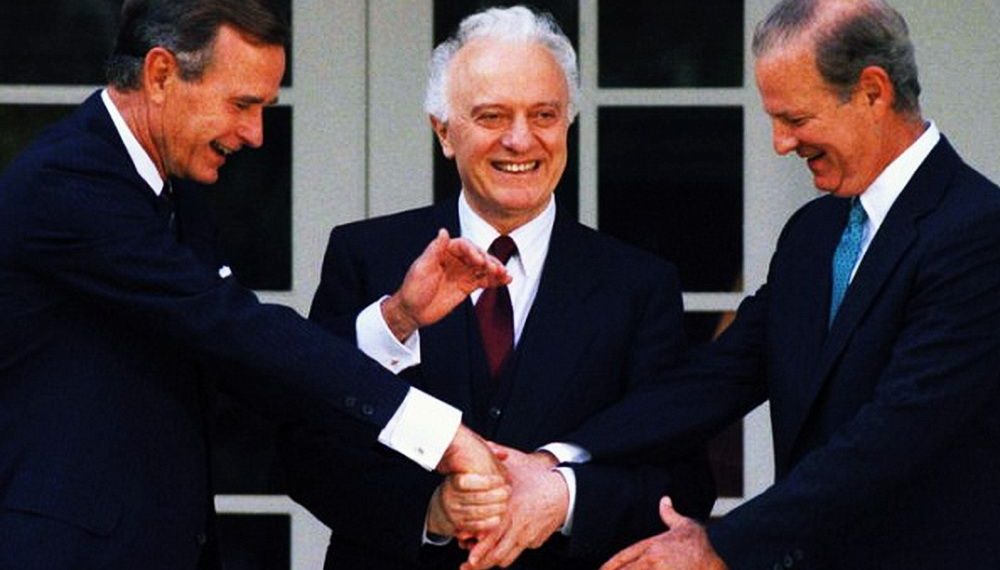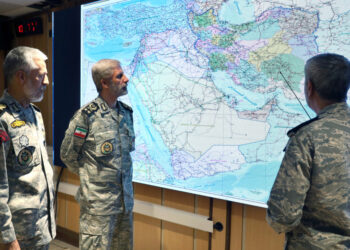MOSCOW (Realist English). This year marked the fourth decade of temporary application of the Agreement between the Soviet Union and the United States on the Maritime Delimitation Line (The Agreement between the United States of America and the Union of the Soviet Socialist Republics on the Maritime Boundary). The document was signed in Washington on June 1, 1990 by Soviet Foreign Minister Eduard Shevardnadze and U.S. Secretary of State James Baker.
At the suggestion of the Americans, the Parties additionally agreed to apply the provisions of the 1990 Agreement on a temporary basis from June 15, 1990 until its ratification by both sides. This agreement was formalized by exchange notes, and forced our Far Eastern fishermen to urgently leave their historical fishing areas in the Bering Sea, which in connection with the reached “demarcation line” turned out to be in the American zone.
The annual losses of our fleet, due to the withdrawal from these areas, at that time amounted to at least 150 thousand tons, and in the future up to 300 thousand tons annually. The losses affected not only fish, but also significant areas of the continental shelf promising for hydrocarbon reserves. That is why this Agreement of 1990 was named by fishermen as the “Shevardnadze betrayal line”. All this was reflected in detail in articles published on various media platforms, including the Realist Information Agency.
It should be reminded that the “line of maritime delimitation” is so named by the 1990 Agreement in the Russian text. But in English, in the same Agreement of 1990, it sounds like “maritime boundary”, which is more consistent with the Russian translation as “sea border”. As they say in Odessa, “feel the difference.”
Indeed, it is really significant. This author at one time had to discuss this topic with American officials, including representatives of the US Coast Guard. All of them confirmed that for them it is really a “sea border”, which they are obliged to protect and prevent its violations by vessels, citizens of other states. Subsequently, the American Coast Guard applied this approach practically, detaining Russian fishing vessels in the Bering Sea even with the slightest suspicion of violating this “maritime border”.
The length of the “demarcation line” — the “sea border” is 5289 km. This is the world’s longest “line of demarcation” between neighboring states. It delimits between Russia and the United States in the North Pacific Ocean, in the Bering, Chukchi Seas and in the Arctic Ocean both 200-mile exclusive zones and the continental shelf, as well as territorial waters.
It was assumed by both sides, and they were then Gorbachev-Shevardnadze from the USSR and George H.W. Bush-Baker from the USA, that the ratification of the 1990 Agreement would not take much time and could take place almost simultaneously in the USSR and the USA.
However, after reviewing the provisions of the Agreement and the unexpected agreement on its temporary application, the deputies of the Supreme Soviet of the USSR did not agree to ratify it “soon”. It was proposed to hear Shevardnadze on this issue in detail.
Simultaneously, critical articles by scientists, fishermen, and observers on this agreement began to appear in the media. There were also appeals on this issue and a number of international experts directly to Mikhail Gorbachev. Yevgeny Primakov, as the director of IMEMO, expressed his very critical opinion. The negative attitude of the USSR Ambassador to the USA Dobrynin to the 1990 Agreement at that time is also known, as he mentions in his memoirs.
There were enough arguments for the deputies of the Supreme Soviet of the USSR to reject the ratification of the 1990 Agreement as causing economic damage and not meeting the national interests.
I believe that all this, along with other circumstances, forced Shevardnadze to resign. The following fact is also interesting. In his repeated memoirs about cooperation with the United States, Shevardnadze, like Gorbachev, never mention their “achievements” under the 1990 Agreement. Still, I think they also understood that they had gone too far in making concessions to the Americans.
Seeing how things were not going in favor of the ratification of the 1990 Agreement in the legislative body of the Soviet Union, the White House, wanting to “put pressure” on the USSR, promptly ratified the document on September 16, 1991. The US Senate approved it: “in favor” — 86, “against” — 6 votes. An article in The Washington Post dated September 17, 1991 stated: “In defense of the treaty, the State Department said that 70% of the territory of the Bering Sea would be under the jurisdiction of the United States and would give the country 13,200 square nautical miles more space than if the line was drawn at an equal distance between the coasts.”
Subsequently, with the collapse of the USSR, Americans had hope that the new leadership of Russia, taking a course towards the revival of capitalism and blindly following American recommendations, would still successfully ratify the 1990 Agreement. But events followed a different scenario.
Attempts to ratify the 1990 Agreement in the times of Boris Yeltsin, and in the subsequent Putin–Medvedev–Putin era were unsuccessful. Deputies and senators, and most importantly the majority of citizens, understand that such an agreement does not meet the national interests of Russia.
Despite this, the authorities have continued to use it for more than thirty years in violation of all Russian regulations. In our Russian reality, the intergovernmental Agreement of 1990 between the two nuclear powers turned out to be, as they say in a certain circles, “a made law.”
What, then, prevents the executive and legislative authorities of Russia from deciding on the compliance with its national interests under the 1990 Agreement? If it corresponds to this, then submit it for ratification. Or, if the opposite is true, reject it by notifying the American side about it.
The Kremlin’s decision-making, I believe, is influenced by the same subservience to the Americans and the fear of admitting their mistakes made in the past when developing the directive provisions of the Soviet delegation for negotiations with the United States on the delimitation of maritime spaces.
And yet it is time for the Russian authorities, relying on the real support of deputies, senators, public opinion, taking into account the current situation and for the future, to decide on the 1990 Agreement, as not meeting our national interests, and to bring it out of the zone of “made law”, as people say, to clear water.
The references of a number of analysts and diplomats that the Americans will not agree with us and will insist on continuing the implementation of the 1990 Agreement, since we have been observing it for the fourth decade, and that they will not go to its revision, this is not our concern, but the one of the American side.
The Chairman of the Federation Council Valentina Matvienko is right here, saying while discussing this issue, at one of the plenary sessions back in October 2019:
“We are still shy, we are still modest. We are being hammered on all these very things, and we only threaten that we will take symmetrical measures. So it is necessary to take symmetrical measures — well, how much can you swallow such an attitude towards Russia?”
Really — how much longer?
Vyacheslav Zilanov is a member of the Scientific Expert Council of the Maritime Collegium at the Government of the Russian Federation, Honored Worker of the Fisheries of Russia, honorary citizen of the Murmansk region, Special to Realist English


















